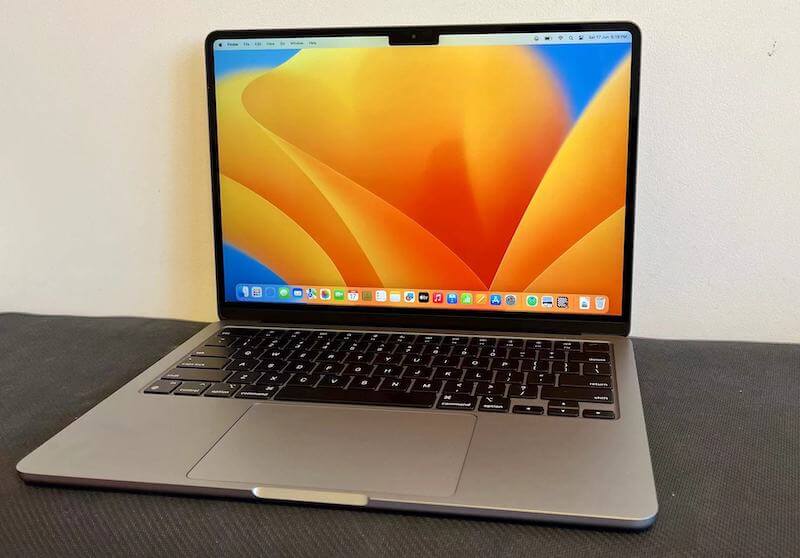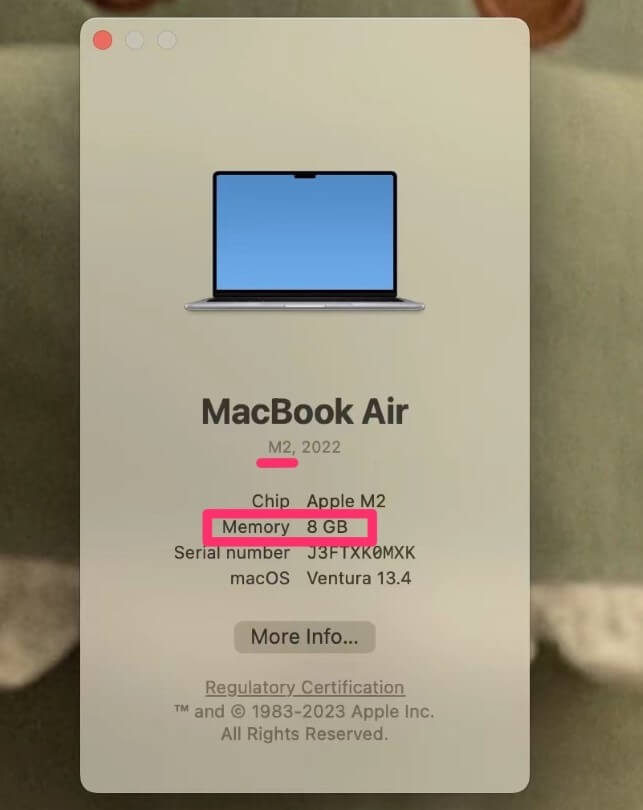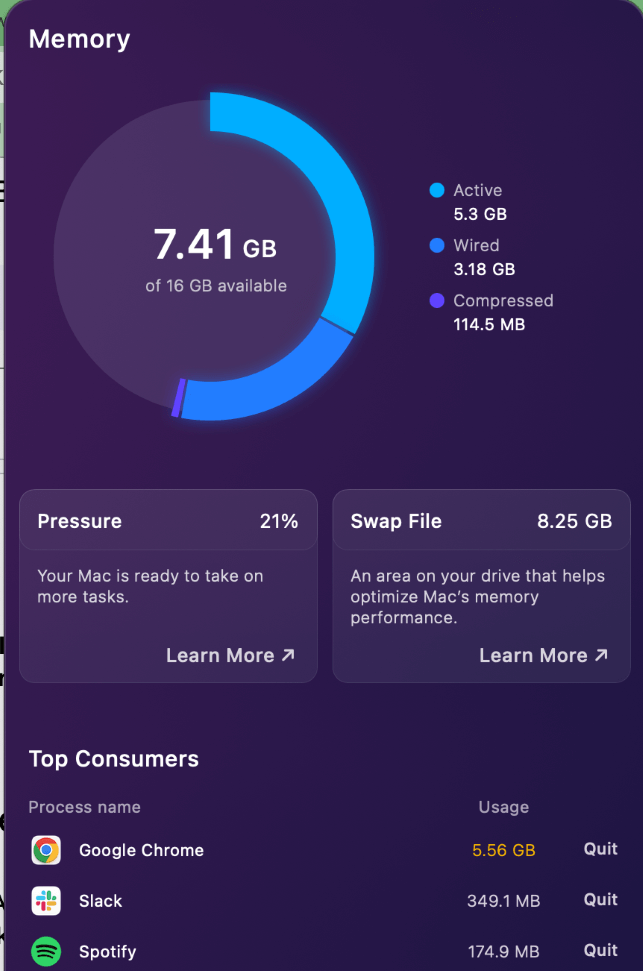If you’re considering a new MacBook Air, or wondering if your current MacBook Air needs an upgrade, you may be thinking: How much memory do you really need in your MacBook Air? And is 8GB enough?
While 8GB might serve the needs of everyday users, those planning to multitask heavily or delve into professional-grade tasks should look at higher memory options. Importantly, remember that the memory cannot be upgraded later, so err on the side of caution and anticipate your future needs.

In my time as an Apple repair tech, I have been asked this question dozens of times. The answer comes down to what your plans are with your computer. It is often very simple to determine how much memory you need, and if 8GB is really enough.
Let’s get into it!
Note: this article will focus solely on Apple Silicon M1 or M2 MacBook Air.
Table of Contents
Key Takeaways
- Understanding the difference between memory (RAM) and storage is crucial. RAM facilitates your MacBook Air’s speed and ability to multitask efficiently, while storage saves your files and data.
- The M2 MacBook Air offers three RAM options: 8GB, 16GB, or 24 GB. The M1 MacBook Air provides two: 8GB or 16 GB.
- For everyday users, 8GB of RAM is typically sufficient. This includes tasks like writing papers, sending emails, and browsing the internet with a moderate number of tabs.
- If you’re frequently seeing a “Not enough memory” message or if you are a heavy multitasker, consider the 16GB option. This is particularly important if you’re involved in activities requiring more processing power, such as professional photo editing, video editing, and software development.
- Keep in mind that the memory of Apple Silicon MacBook Airs cannot be upgraded later. Therefore, try to anticipate your future needs and consider choosing a higher memory option if you foresee more intensive tasks down the line.
- Monitor your MacBook Air’s memory usage in real-time with third-party apps like CleanMyMac X, especially if you’re not planning an upgrade soon. These tools can notify you when you’re running low on memory and allow you to manage resource-heavy applications effectively.
How Much Memory Do I Need for a MacBook Air?
While memory is a simple concept, it can be very difficult to decide on the amount of memory that you need for a MacBook Air.
First, I think it is important to understand what “ memory” is and what it is used for prior to making a decision.
The Difference Between Memory and Storage
Memory and Storage are two different things when we are talking about computers.
When we are referring to “Memory” of the computer, we are referring to the space in which the computer has allocated for instructions and data. This is commonly known as RAM.
The information that is stored in RAM or Random Access Memory are things such as the document that you have open and are working on so that it is able to load quickly as you type. RAM is lost when a computer loses power, but don’t worry, this is supposed to happen!
This is to keep the processor clear of unnecessary information and keep your MacBook Air running as quickly as possible.
On the other hand, storage refers to the location in which your computer stores your saved files and data, such as pictures, saved word processing files, etc. This article only focuses on Memory/RAM.
RAM comes in three options for the M2 MacBook Air (8GB, 16GB, or 24GB) and two options for the M1 MacBook Air (8GB, 16GB). The M2 MacBook Air is the latest version of the MacBook Air and is the newest MacBook Air at the date of writing this article.
As discussed above, RAM is temporary memory storage that your computer will access most often and quickly. It is a big contender in the performance of your computer as a whole.
Specifically, RAM will impact your MacBook Air’s ability to multitask efficiently. The computer uses RAM to store information that will need to be accessed quickly and frequently.
RAM keeps this information in the forefront of the memory in order to reduce the amount of time needed in order to reach that memory. This is what makes it key to keeping the processing time lower and allowing for more multitasking by accessing the memory more quickly.
That being said, Apple has designed its silicon chips to be very effective with minimal amounts of memory.
Is 8GB RAM Enough for MacBook Air?

For applications and tasks that require less Random Access Memory, such as writing papers, emails, browsing the internet without too many tabs open, basic computing, etc. 8GB of Memory is more than enough. This is what we would consider the everyday user.
However, it is possible that you currently own the basic model of MacBook Air or another 8GB computer, and you have seen the dreaded “Not enough memory” message. If this is the case, I would recommend considering the next level of memory up, to avoid this in the future.
Also, if you find yourself using your MacBook Air for heavy multitasking, or programs that require a lot of processing power (i.e., professional photo editing), maybe the next option is a better option for you.
Should I Get 16GB RAM for MacBook Air?
For more moderate users that need a bit more memory, tasks such as professional photo editing, video editing, software development, or other basic engineering tasks, or are a student that will be watching your video streaming while completing your midterm paper, then you may want to consider getting the 16GB of Memory.
While 8GB RAM potentially would be able to handle the processing, the speed of your applications and multitasking will be more reliable with 16GB RAM. You will also see the “spinning beachball of death” less often, as your computer will likely not need the additional processing time when you have more RAM.
Is 24GB RAM Necessary for MacBook Air?
If you believe you are a user that could potentially fit into a MacBook Pro level of needed processing speed and power, then the M2 Macbook Air with 24GB of memory may be for you.
Since the 24GB RAM option is so new, it is not very clear the comparison between this and the MacBook Pro. However, what we do know is that with the Apple Silicon M2 chip and 24GB of RAM, the MacBook Air will be extremely powerful compared not only to the other Macs, but also to other computers in its competition.
This is going to be more for the users that will need the processing power similar to (if not potentially the same as) the MacBook Pro, without the size or without some of the more complex features, such as the touch bar.
You Can’t Upgrade RAM in Silicon MacBook Airs
When choosing how much memory you need for your MacBook Air, be cautious of the fact that in Apple Silicon MacBook Airs, you are unable to upgrade the memory at a later time.
This means the memory that you choose is the memory that you will have for the lifetime of the computer.
So, if you are currently a basic user, but are planning to go back to college or learn to program or become a photographer/videographer that will need to edit, then you may want to get a step (or even 2) of memory above what you are planning for.
If there is any potential that you could use the MacBook Air for more intensive tasks at a later date, try your best to plan for this now, as this could drastically impact the performance of your computer at that time.
The last thing we want is for you to make the investment in your MacBook Air and find you need more memory at a later date when this could be remedied now. If possible, with your budget, when it comes to RAM, I would suggest always considering and comparing the model you think you need and the next model level up.
How to Monitor Memory Usage on MacBook Air
If you already have a MacBook Air with 8GB, and are not looking to upgrade anytime soon, there is one thing you can do to keep your RAM usage in check.
Using a third-party app like CleanMyMac X to monitor your resources in real-time, and alert you when you’re running low on memory can help you make the most of your system.
While not an entirely free program, you can certainly benefit from the handy tray icon giving you insight into your MacBook’s memory usage. You can even close resource-hungry applications in the same location.

Final Thoughts
Choosing the right memory for your MacBook Air is a crucial decision that should consider both your current and potential future usage.
Utilize apps to keep track of your memory usage and manage your resources effectively. With careful consideration and management, you can optimize your MacBook Air’s performance and longevity.
How much memory does your MacBook have? Is 8GB enough for you? Let us know in the comments below!
